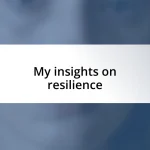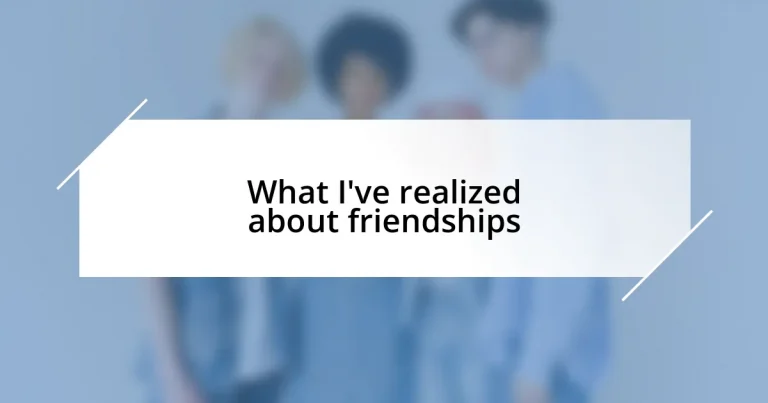Key takeaways:
- Friendships provide vital support, a sense of belonging, and encourage personal growth.
- Different types of friendships, such as “adventure buddies” and “comfort zone friends,” fulfill distinct emotional needs.
- Building trust requires open communication, reliability, and respect for boundaries.
- Healthy boundaries enhance friendships by fostering mutual respect and understanding without feelings of obligation.
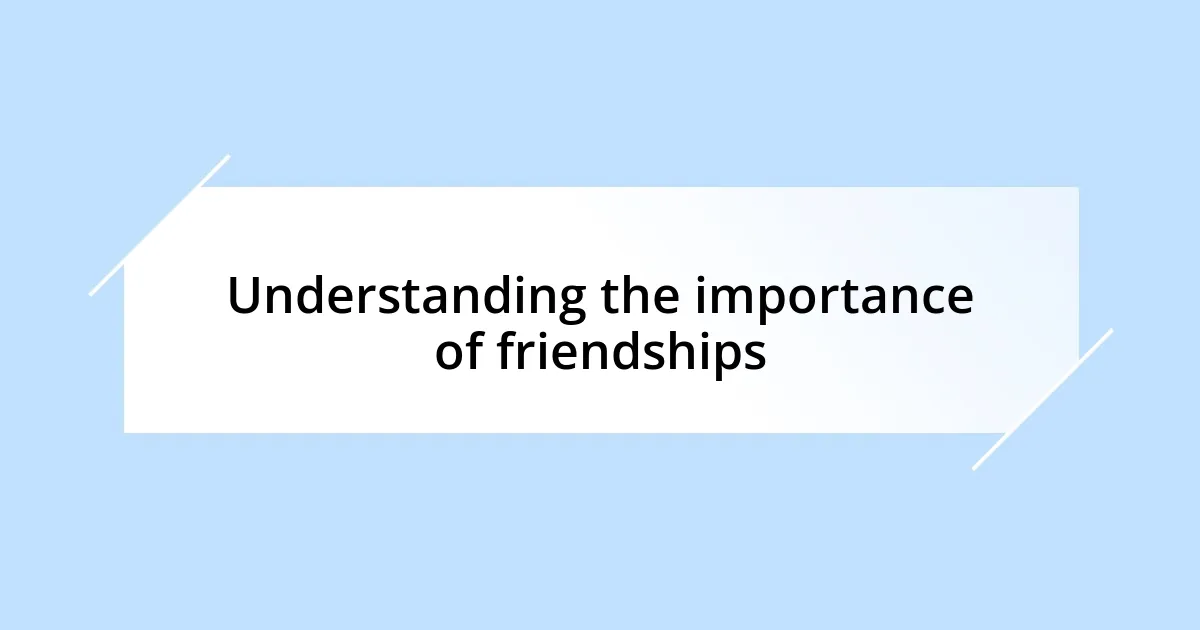
Understanding the importance of friendships
Friendships serve as a vital support system in our lives. I can recall a particularly challenging time when a friend simply listened as I poured out my worries, making me feel less alone. Isn’t it fascinating how just one conversation can lift your spirits?
Moreover, friendships provide us with a sense of belonging that is essential for our well-being. I often find myself reflecting on the shared laughter and experiences with my close friends, which make me appreciate that connection deeply. Have you noticed how teamwork and communication flow easier when it’s with those you trust?
Lastly, friendships encourage personal growth. A friend once challenged my perspective on a topic I was passionate about, leading me to reconsider my views and expand my understanding. Isn’t it incredible how the people we choose to surround ourselves with can push us towards becoming the best versions of ourselves?
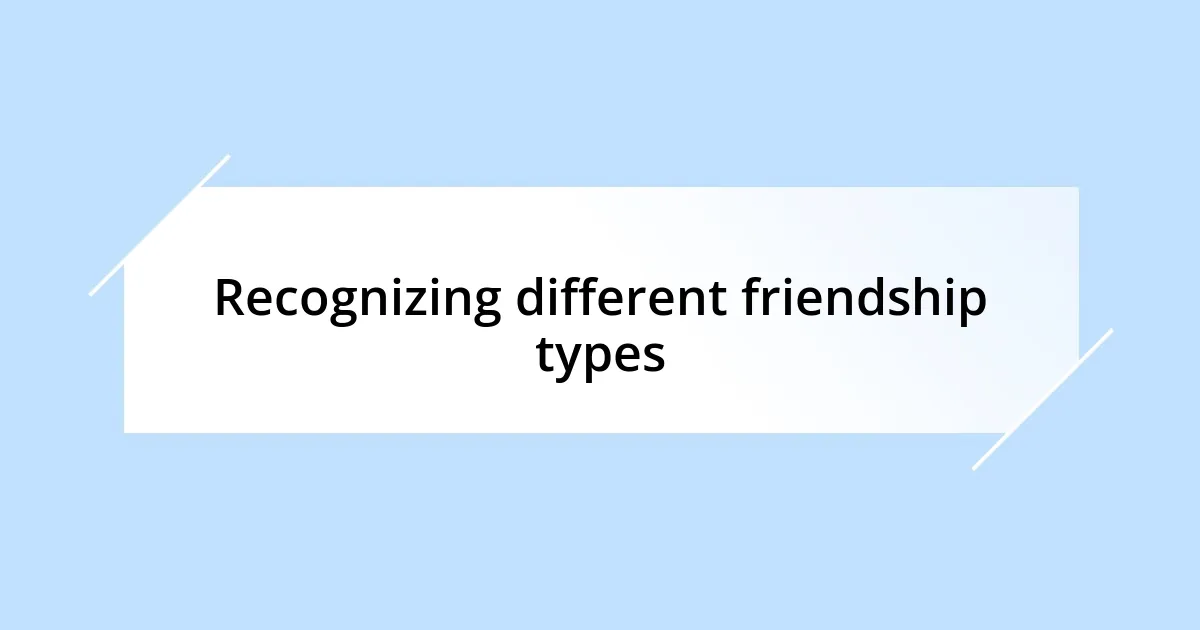
Recognizing different friendship types
Recognizing different friendship types can be insightful in understanding our relationships better. Throughout my life, I’ve encountered various friendship dynamics. For instance, I have that one friend who is always up for an adventure, no matter how spontaneous. This friendship type, often described as the “adventure buddy,” is one where excitement and exploration take center stage. Don’t you have someone like that in your life who pushes you to try new things?
On the flip side, I also cherish my “comfort zone” friends, those who are there for quiet nights in with movies and snacks. These friendships create a safe space for vulnerability and deep conversation. It’s fascinating how both types, though contrasting, fulfill different emotional needs in my life. They remind me that friendships can be multifaceted, each one offering something unique.
When I think about friendships, it becomes evident that recognizing these types allows us to nurture them in meaningful ways. By understanding which friendships energize us and which ones provide solace, we can invest our time and feelings appropriately. What about you? How do these different types show up in your life?
| Friendship Type | Description |
|---|---|
| Adventure Buddy | Encourages spontaneity and new experiences. |
| Comfort Zone Friend | Provides a safe space for vulnerability and relaxation. |
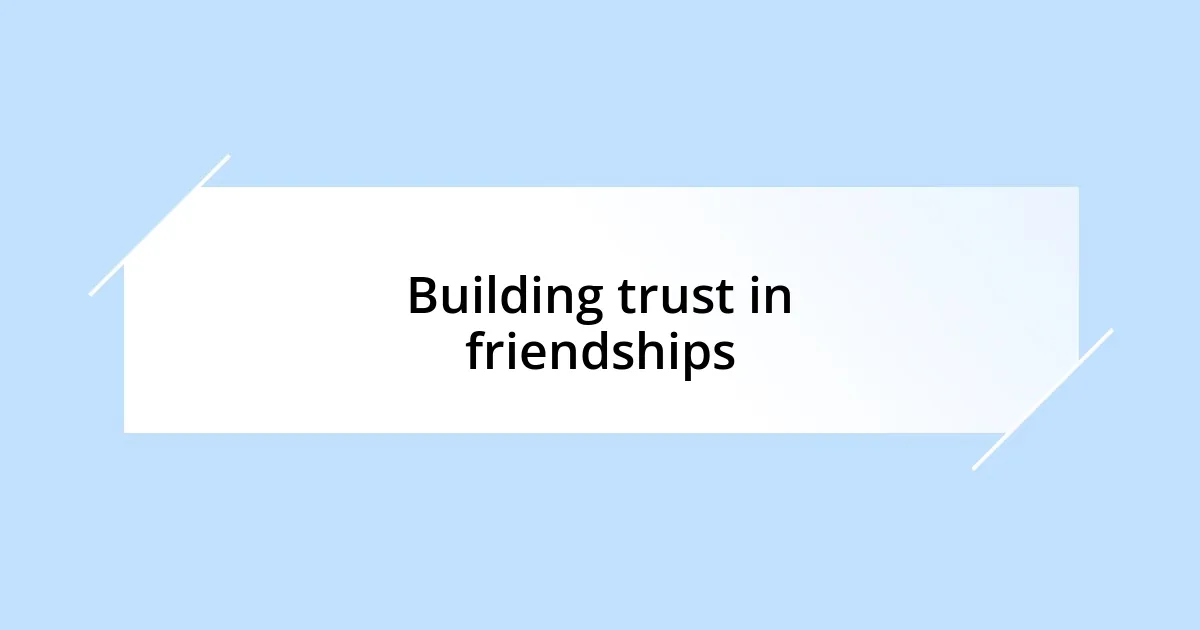
Building trust in friendships
Building trust in friendships is truly essential for creating a bond that lasts. I’ve found that being open and honest about my feelings helps keep the lines of communication clear. There was a time I hesitated to share my struggles, thinking I might burden my friends. But once I let them in, it strengthened our connection significantly. Trust isn’t built overnight; it’s a gradual process that flourishes with consistent effort.
To cultivate trust, consider these strategies:
- Be reliable: Show up when you say you will, whether it’s for plans or emotional support.
- Practice active listening: Engage fully in conversations; this shows you genuinely care.
- Share vulnerabilities: When you open up, it encourages your friend to share too.
- Avoid gossip: Keeping confidences strengthens trust and allows for deeper conversations.
- Respect boundaries: Everyone has their comfort levels; acknowledging them is key to lasting trust.
Recognizing how these elements have played out in my friendships has made a noticeable difference in the depth and resilience of those connections. I hold dear the times when a friend turned to me in their moment of need, and I could stand firmly by their side without hesitation. It’s this reciprocity of trust that truly makes friendships flourish.
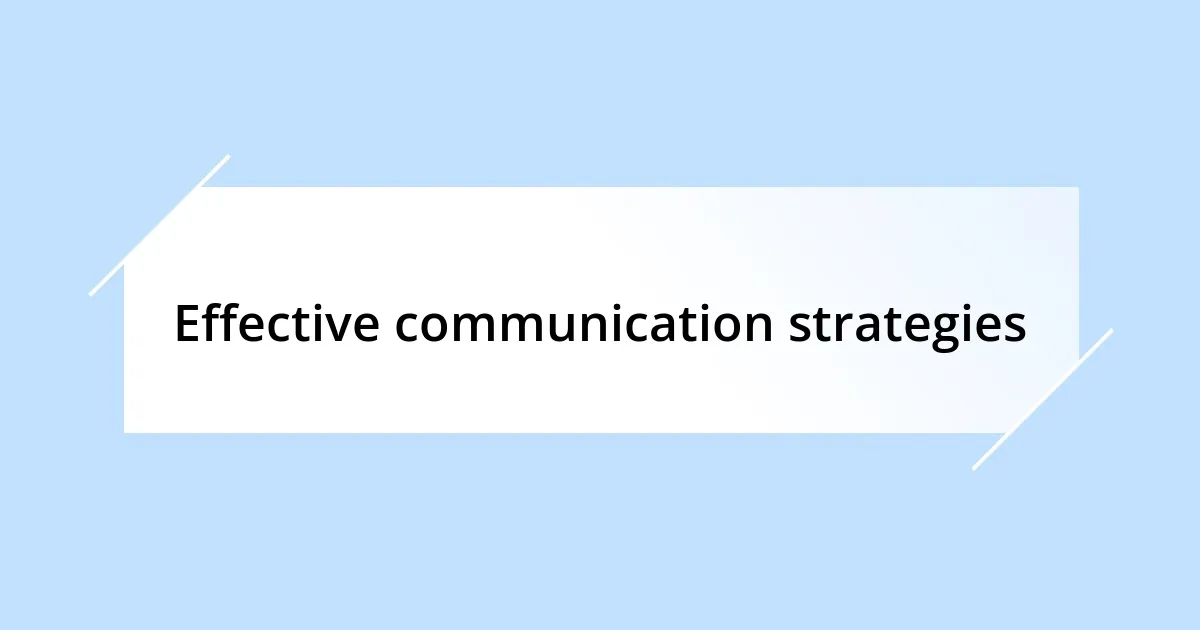
Effective communication strategies
Effective communication is the backbone of any strong friendship. I remember a time when I misinterpreted a friend’s message, thinking they were annoyed with me. Instead of assuming the worst, I decided to ask them directly. This simple conversation cleared the air and deepened our understanding of each other. Isn’t it amazing how a few honest words can shift our perspective?
One strategy I’ve found helpful is to practice “I” statements. For instance, instead of saying, “You never listen,” try, “I feel unheard when I’m sharing something important.” This approach not only takes the blame off the other person but also expresses my feelings clearly. Engaging in this kind of open dialogue has often led to deeper trust between my friends and me. Have you ever noticed how discussing feelings instead of pointing fingers can transform a conversation?
I’ve also discovered the power of non-verbal communication. I can recall a moment when a close friend was going through a tough time; words fell short. Just being there, offering a comforting hug, or a simple smile was often all it took to convey support. As I’ve realized, sometimes it’s not about what we say, but how we make our friends feel in those moments. Have you experienced how silence can speak volumes in a friendship?
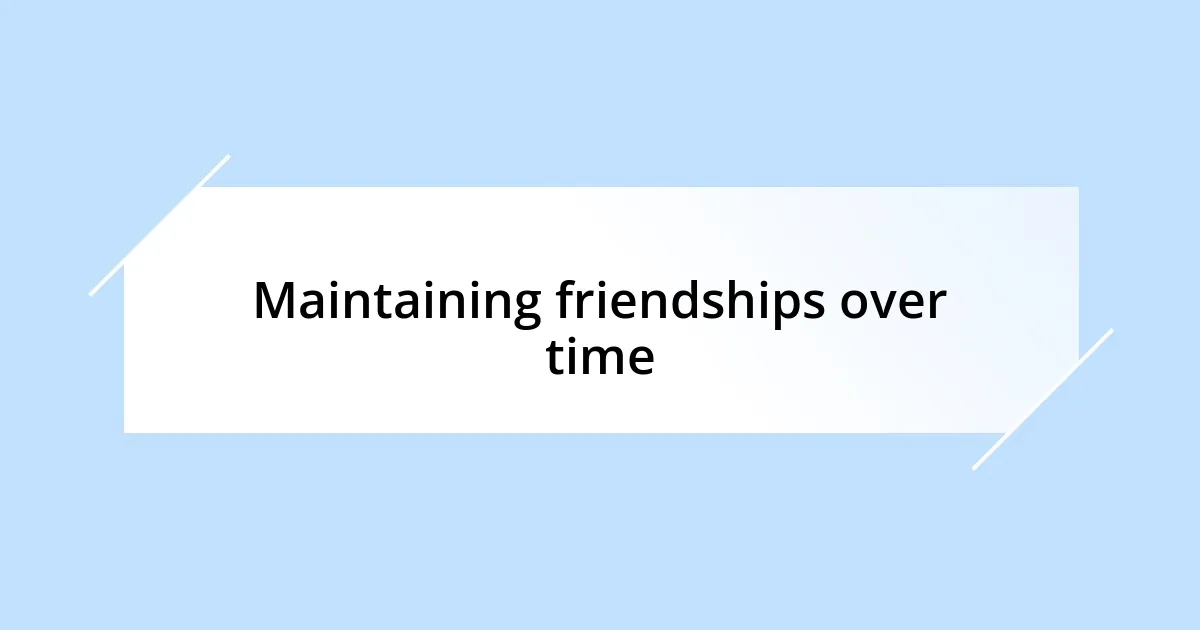
Maintaining friendships over time
Maintaining friendships over time requires consistent effort and a willingness to adapt. I’ve often found that scheduling regular catch-ups—whether it’s a simple coffee or a video call—makes a world of difference. I remember a time when my best friend and I drifted apart because life got busy; once we made it a priority to set aside time for each other, our bond rekindled faster than I expected.
Another crucial aspect is showing appreciation. I’ve made it a habit to send little notes or texts just to let my friends know I’m thinking of them. It’s surprising how these small gestures can uplift someone’s day and reinforce the connection. Have you ever noticed how a few kind words can transform an ordinary day into something special? I certainly have, and it’s these gestures that often lead to deeper conversations and understanding over time.
Lastly, I’ve realized that embracing changes—like moving to a new city or starting a family—rather than resisting them, is vital. I’ve had friends whose lives took them in entirely different directions, but rather than growing apart, we made an effort to explore those changes together. By sharing new experiences, I’ve found that our friendship can evolve while still keeping the core connection alive. Isn’t it remarkable how we can adapt and grow together, even when our paths diverge?
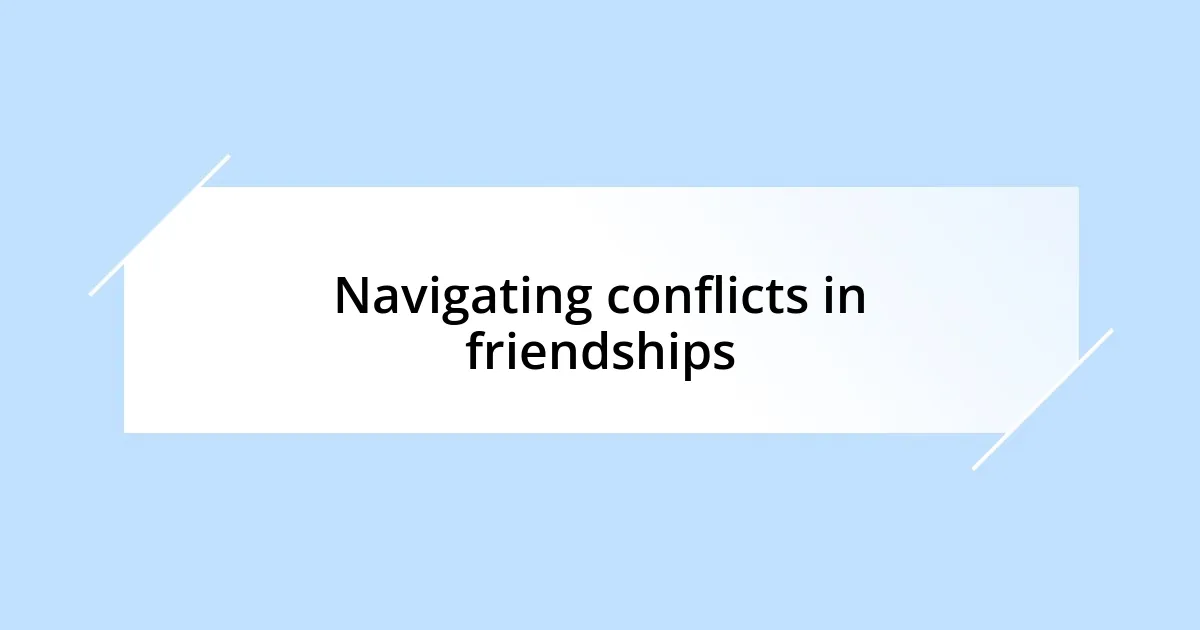
Navigating conflicts in friendships
Navigating conflicts in friendships can be tricky, but I believe they often present invaluable growth opportunities. I once had a misunderstanding with a childhood friend that escalated over something trivial—a missed birthday text. Instead of letting resentment fester, I decided to face the situation head-on. We both shared our feelings, and through that conversation, I realized how crucial it is to address conflicts rather than allowing them to simmer beneath the surface. Have you ever had a small issue blossom into something bigger simply because it was left unspoken?
Another significant aspect of resolving conflicts is timing. I’ve learned that discussing disagreements when emotions are high often leads to more hurt feelings. There was a time when I tried to confront a friend right after an argument, and it only made matters worse. Taking a step back allowed me to gather my thoughts and approach the situation with empathy. I’ve found that waiting for the right moment to discuss issues can transform a confrontational dialogue into a productive conversation. Have you noticed how the words we choose and the timing can make all the difference?
Finally, offering forgiveness—even before the other person asks for it—can be incredibly freeing. I experienced this when I had a falling out with another close friend over a disagreement about priorities. I chose to forgive first, realizing that our friendship meant more than being right. To my surprise, this gesture opened the door for a deeper conversation about our needs and values, illustrating that sometimes it’s not about the conflict itself, but our willingness to move past it. Have you ever felt how a small act of kindness during a tough moment can shift the entire dynamic of a friendship?
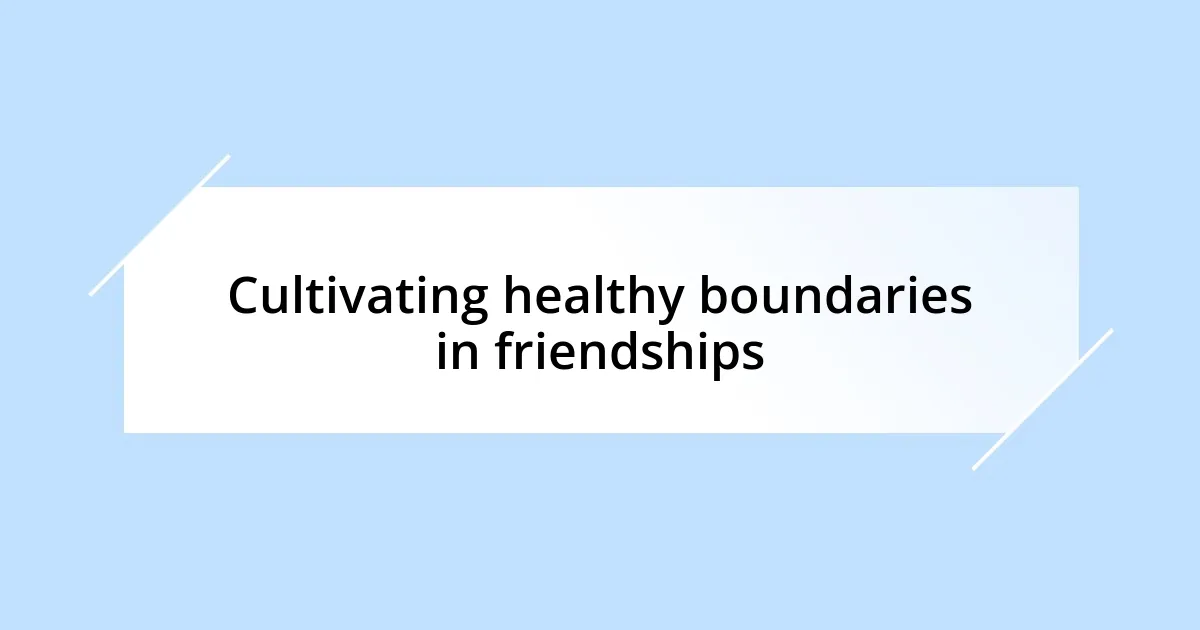
Cultivating healthy boundaries in friendships
I’ve come to realize that establishing healthy boundaries in friendships is essential for mutual respect and understanding. A close friend of mine once overwhelmed me with constant requests for support during a difficult time. At first, I felt obligated to be available, but I soon recognized my own emotional needs were suffering. By gently communicating my limits, I not only felt more balanced, but our friendship deepened because we both learned to honor each other’s space and feelings.
Creating boundaries isn’t just about saying “no.” It’s also about prioritizing what matters most in a friendship. I remember a period when my schedule was packed, and I couldn’t always be there for friends like I used to. Instead of ghosting them, I took the time to explain my situation, and unbelievably, my friends were supportive and understanding. Isn’t it interesting how a transparent conversation can transform reluctance into empathy? I now see boundaries as a bridge to stronger connections, not a wall.
To truly cultivate healthy boundaries, I’ve learned to check in with myself often. Are my needs being met? Am I being honest about my availability? I often ask my friends how they’re feeling about our dynamic, which encourages open communication. This proactive approach has led to many breakthroughs, including a friendship that flourished after we both realized we needed to recalibrate our expectations. Have you ever thought about how asking simple questions can open doors to deeper understanding?











